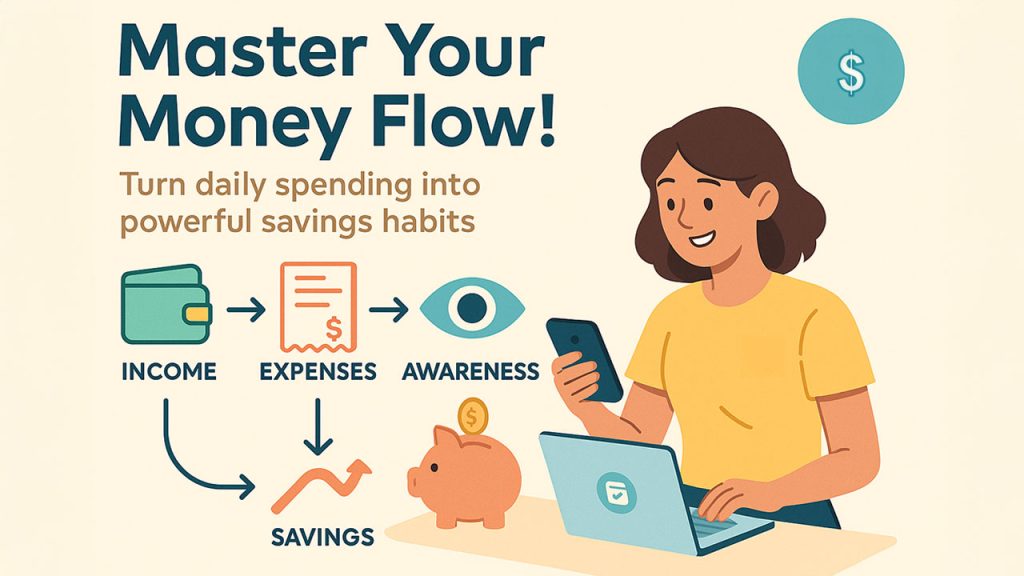If one thing is true about money, it is the fact that it goes away quietly — forgotten subscriptions, small purchases, and impulsive buying habits. Many of us wonder: What
If one thing is true about money, it is the fact that it goes away quietly — forgotten subscriptions, small purchases, and impulsive buying habits. Many of us wonder: What is the easy way to keep track of spending? In 2025, as the cost of living continues to rise, every cent counts. Cash apps as well as monthly expense trackers can aid us in saving money, uncovering spending patterns, and improving overall financial habits.
Using Monthly Expense Trackers For Daily Awareness

Monthly expense trackers don’t have to be all about the numbers. They provide us with a complete picture of income, fixed expenses, and discretionary spending. By looking at expenses each week, we notice where money drips out — fast food, underused memberships, or online shopping.
- They provide visibility into habits.
- They allow adjustments before overspending leads to overwhelming debt.
- They enable us to remember that savings must be a priority ahead of frivolous spending.
People with regular spending trackers save up to 20% more per year than people who don’t. That proves the method works.
Expense-Tracking Apps That Simplify Budgeting
Traditional notebooks or spreadsheets often fail because they require too much manual effort. Instead, expense-tracking apps have become the new norm. The pocketguard budgeting app, for instance, connects to bank accounts, segments transactions, and showcases how much money can be spent safely after bills and saving objectives.
There are other expense-tracking applications that utilize visual charts and alerts, making it simpler to understand the flow of money. They answer a vital question you must know: How you can control your expenses and save money in 2025? By indicating how much money you can spend on your entertainment, outings, and online shopping spree, they take the guesswork out of the game and boost mindful decisions.
How Advanced Expense Trackers Operate in 2025?
It is important to keep in mind that every strong budgeting plan requires a sophisticated financial technology system. Expense-tracking apps in 2025 depends on AI-driven analytics, data synchronization in real-time, and cloud-powered storage to ensure accurate and immediate insights into your spending behavior.
Bank Integration Through Encrypted APIs:
Modern trackers directly link with your financial institutions via secure API connections. This enables the app to import automatically and segment transactions without needing manual entry of data. Security standards such as OAuth 2.0 make sure that your banking credentials remain inaccessible and safe to third parties.
1. Machine Learning and AI Categorization:
Artificial Intelligence (AI) models assess transaction descriptions and merchant information to categorize expenses into utilities, groceries, or entertainment. With time, sophisticated machine learning algorithms adjust to your behavior — recognizing subscriptions, recurring payments, and patterns of spending more accurately.
2. Predictive Insights in Spending:
By gaining insights from historical data, expense trackers predict upcoming bills and possible overspending risks. Such predictive insights allow you to proactively adjust budgets. For instance, if the system notices that you are spending more on outings compared to last month, it issues an alert automatically recommending category adjustments.
3. Reporting and Data Visualization:
Visual dashboards change raw numbers and convert them into line graphs, pie charts, and bar metrics. Advanced systems process such analytics in real-time through sophisticated frameworks of data visualization incorporated within the app, enabling users to compare monthly and weekly spending trends.
4. Cross-Device Cloud Sync:
Since all information is stored securely in the cloud, users can access budgets across all devices like tablet, smartphone, or desktop without risking the loss of data. End-to-end encryption makes sure that personal financial information remains private even in transit.
5. Automated Recommendations on Budget:
Advanced tools now provide smart recommendations, driven by AI-powered financial modeling. Such models assess your spending behavior, income, and savings targets to recommend smart adjustments such as allocating an extra 5% to your emergency fund or minimizing entertainment spending by at least 10%.
By integrating security, automation, and smart analytics, advanced expense trackers go beyond manual bookkeeping — they work as personal financial advisors, streamlining decision-making and enabling users to consistently save throughout the year.
Process to Establish a Sustainable Budgeting System
Budgeting does not prove to be successful in the long run if it is too restrictive. More sustainable systems balance discipline with flexibility. Put it into practice:
You should also list all possible sources of income. This can involve part-time, full-time, or temporary work with passive streams of revenue from everywhere e.g., renting property to tenants in the city and rental properties on distant Pacific islands.
- Place expenses into categories. There are essentials you must have, such as rent and utilities, as well as nonessentials like entertainment or eating out at restaurants.
- Start using a monthly expense chart. Keeping records automatically ensures accurate data.
- Create financially achievable goals. Begin with 10% of your income and increase from there gradually.
- Check with your finances. Just as life continually changes, so should budgets.
The regular savings this system allows, without excessive trimming needed, is accurately descriptive of how it works.
What Is The Easy Way To Keep Track Of Spending?
The simplest approach is automation. Expense-tracking apps log transactions immediately, and monthly reports show spending patterns. We should focus on making informed decisions, rather than just punching in numbers by hand. Can we afford to cut dining out? Is it time to save more?
One London family, for example, found a tracker set up over a year revealed that they were spending £150 per month on delivery apps. By eating at home two more nights a week, they funneled that money to their emergency fund. A small change, big outcome.
How To Spend Less In 2025? Practical Adjustments
Finding ways to spend less money need not mean living like a pauper. With just a few easy changes, you can realize long-lasting benefits:
- Cancel subscriptions you don't even use.
- Plan ahead your shopping trip so mystique sales buy at a discount do not happen all around
- Turn off the brand of essentials and buy generic.
- Cash in government refunds and store loyalty points.
Match this with a monthly bill on one hand, as well as calculators of the three kinds just days later. It's not just casual spending but purposeful that endures.
Conclusion: Building Better Habits For The Future
The idea of tracking your expenses seems simple — but it changes how we think about money. The apps for expense tracking and monthly expense trackers give a lot of clarity, allowing to make prudent purchasing decisions. Such apps can be a vital asset to save money without feeling too bounded.
So, what is your overall approach to listing: How do you choose to follow along, and which techniques or tools work perfectly for you in 2025? Leave your story in the comments — let us know how you’ve created financial freedom.
Respond to this article with emojis






